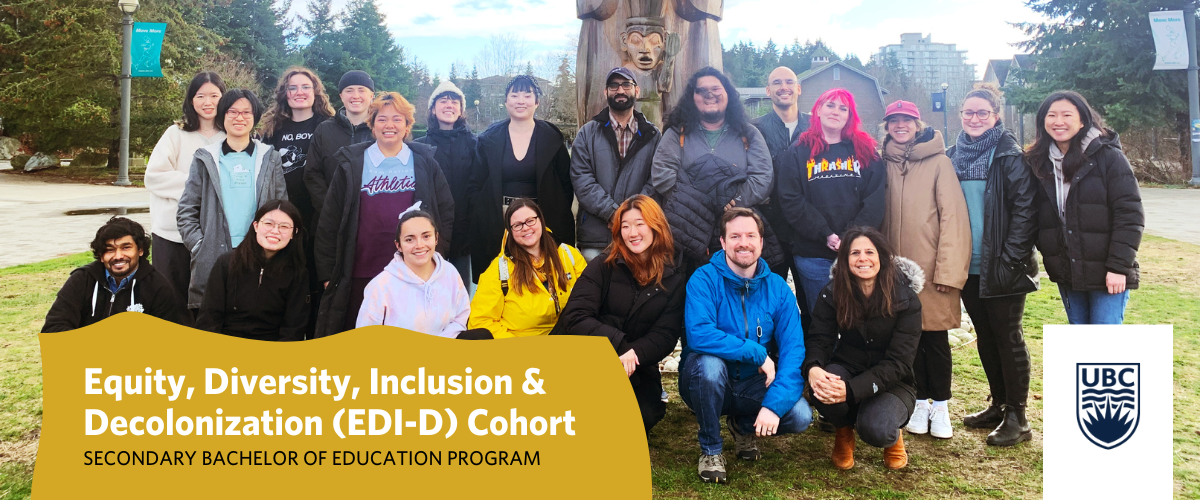
By Farah Meralli, Adjunct Professor and Faculty Advisor, EDI-D Cohort, Faculty of Education
In September 2022, the UBC Faculty of Education, in collaboration with the Richmond School District, launched an exciting Equity, Diversity, Inclusivity and Decolonization (EDI-D) cohort for secondary education students in the 2022/23 11-month Bachelor of Education program. The cohort is made up of 22 teacher candidates from different curricular areas that focus on approaching pedagogy, planning, and learning with an EDI-D lens. This year’s group includes a unique demographic mix of students, including members of the IBPOC and LGBTQIA2S+ communities and year-four students in the Indigenous Teacher Education Program (NITEP) at UBC. The students from various cultural and curricular backgrounds create an incredibly engaging environment for rich discussions and innovative ways of approaching pedagogy.
Both UBC and Richmond School District No. 38 are committed to fostering change in the systems of society, through educating and empowering young people. The Richmond School District has a five-year Strategic Plan 2020-2025 that has put equity and inclusion as one of five strategic priorities. The district strongly believes “equity and inclusion are foundational to learning and leading, and are critical to success, wellbeing, and fulfillment.” Similarly, the UBC Faculty of Education highlights equity, diversity, inclusion, and decolonization as a foundation to leading and learning. The inspiration of the EDI-D secondary cohort is rooted in a synthesis of values and vision of the two institutions.
Equity, diversity, inclusivity and decolonization are topics that are explored in particular depth by the EDI-D cohort during the required inquiry courses EDUC 450, 451 and 452. Focused readings provide a theoretical foundation for students to begin their inquiry journey. This year, guest speakers have included Navshina Savory, Richmond’s District Administrator–Equity, Inclusion and Indigenous Success, along with principals, counsellors, and students, providing authentic learning experiences with current and applicable case studies.
EDI-D is a challenging and fairly new concept in the education system. There are only a handful of universities across Canada that have promoted their EDI-D programs. As a teacher candidate at UBC, I am thrilled to become a part of the leading researchers and educators whose works may contribute to the decolonization of curriculum and pedagogy, and I am looking forward to further explore strategies to design decolonized lesson plans and rubrics in my program.
– Dianna Bao, teacher candidate (Secondary BEd program – EDI-D cohort, Art and Mandarin)
The EDI-D students have long term goals in promoting diversity, inclusion, and equity in BC classrooms. Most of the EDID-D students will be completing their teaching practicum in Richmond School District high schools. They are equipped with inquiry questions that have been inspired by the readings, discussions, and presentations from their EDUC 450 class. All their questions have been influenced by an EDI-D approach and, although the questions will change and evolve, the teacher candidates have a clear focus for their extended practicum. The questions are not curricular focused, but rather skill and strategy focused.
For example, the students have inquiry around ways to decolonize their classroom routines, or assessment practices that empower marginalized voices and create more inclusive classrooms. Some teacher candidates are exploring a universal design to learning (UDL) approach to meet the needs of diverse learners.
The cohort-themed model at UBC provides opportunities for extended learning. While the EDI-D cohort is a pilot program, the aim is to support teacher candidates with weekly seminars during their extended practicum where they can learn from experts in the field and continue their professional learning community discussions.
More than ever, EDI-D is at the forefront of academia and is a priority in the public school system. The cohort focuses on transforming conceptual theories into applicable pedagogical strategies. As the next generation of educators, the teacher candidates are beginning their professional journey with tools of anti-racist pedagogy and an informed practice that is aimed at breaking down systems of oppression. The hope is that teacher candidates will be the leaders of educational change and be part of the slow and steady transformation in making classrooms brave, inclusive spaces that are rooted in equity and diversity.